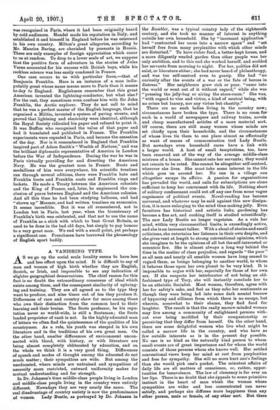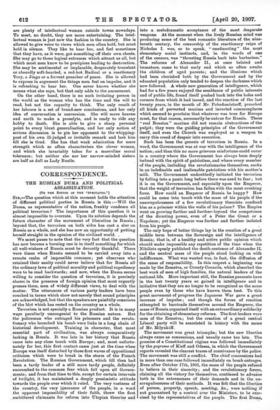A VANISHING TYPE.
AS we go up the social scale locality seems to have less and less effect upon the mind. It is difficult to say of men and women of high birth whether they are English, Scotch, or Irish, and impossible to see any indication of slighter geographical demarcations. The chief reason for this fact is no doubt the extraordinary consensus of ideal which exists among them, and the consequent similarity of upbring- ing and training. They are all agreed as to the type they want to produce, and nine times out of ten they produce it. Differences of race and country show far more among those who owe their distinction from the common herd to their learning and their brains. The Scots professor, be his repu- tation never so world-wide, is still a Scotsman; the Scots landed proprietor of rank is not. In the highly educated man of letters we often find the quintessence of the qualities of his countrymen. As a rule, his youth was steeped in his own literature and in the traditions of his own great men. On the other hand, smaller differences of environment uncon- nected with blood, with history, or with literature are being almost completely obliterated by education, and on the whole we think it is a very good thing. Differences of speech and modes of thought among the educated do not much matter ; their sympathies are wide. But among the uneducated, where minds are untrained and sympathies of necessity more restricted, outward uniformity makes for mutual understanding and for strength.
In Dr. Johnson's time middle-class people living in London and middle-class people living in the country were entirely different. Nowadays they are very nearly the same. The real disadvantage of country society is now the predominance of women. Lady Bustle, as portrayed by Dr. Johnson in
the Itaiitblei, Was a typical col:M{4 lady Of the eighteenth century, and She took no Manner of interest in anything outside her own household. She by "incessant application" had "contracted her cares into a narrow apace" and "set herself free from many perplexities with which other minds are disturbed." To have richer food, a better-kept house, and a more diligently weeded garden than other people was her only ambition, and to this end she worked herself, and scolded her servants from morning to night. For her, politics did not exist, or literature either ; she had never heard of philanthropy, and was too self-centred even to gossip. She had "no curiosity after the events of a war or the fate of heroes in distress." Her neighbours grew rich or poor, "came into the world or went out of it Without regard," while she was "pressing the jelly-bag or airing the store-room." She was, "with regard to vice and virtue, a kind of neutral being, with no crime but luxury, nor any virtue but chastity."
There are no such ladies living in the country now; circumstances have broken the type. There is no room fOr such in a world of newspapers and railway trains, novels and cheap manufactured articles of a more material sort. Of course, there are still many women whose minds are set chiefly upon their households, and the circumstances of whose lives tie them to one place almost as effectually as want of means of communication tied Lady Bustle. But nowadays even household cares have a link with a larger world. A. host of small temptations, too, have been removed out of the way of the average middle-class mistress of a house. She cannot rate her servants; they would not remain to be rated. She cannot be altogether selloentred, wherever she lives. She must take some interest in the life which goes on around her. No one in a village can altogether escape it,s affairs. A passion for organisations has pervaded the world, and calls for subscriptions are alone sufficient to keep her coniereant with its life. Nothing short of solitary confinement could cut off any one from some vague cognisance of political events. Novel-reading has become universal, and whatever may be said against this new dissipa- tion, it is more enlarging to the mind than making jelly. Even furniture has historical and artistic links, gardening has become a fine art, and cooking itself is studied scientifically. The new Lady Bustle no longer vegetates. As a rule her mind, within very circumscribed limits, is exceedingly active, and she is an incessant talker. With a shoal of stories and small criticisms, she entertains her listeners in their own despite, and she gives vent at length to strong conventional opinions, which she imagines to be the opinions of all but the self .interested or eccentric few. She is almost always a long way behind the time in the Matter of class prejudice, and regards "the poor" as all men and nearly all sensible women have long ceased to regard them, as beings belonging to another world, to whom it behoves those upon her own planet to be very kind. It is impossible to argue with her, especially for those of her own sex. If she suspects her interlocutor of not being an old- fashioned type of Tory, she will instantly conclude her to be an atheistic Socialist. Most women, therefore, agree with her for safety's sake, and feel as they echo her sentiments as though they were being led into some dark mental burrow of hypocrisy and silliness from which there is no escape, but wherein, somewhat to their shame, they find food for laughter. The result is that the really narrow-minded woman may live among a community of enlightened persons with- out ever being modified by their companionship or perceiving that they differ from herself. On the other band, there are some delightful women who live what might be called a narrow life in the country, and who have as few outside interests as is in the present day possible. No one is so kind as the naturally kind person to whom small events are of great importance and for whom the world consists of those persons whom she knows well. Har settled conventional views keep her mind at rest from perplexities and free for sympathy. She will no more hurt one's feelings than she would pick one's pocket. The minutest affairs of daily life are all matters of conscience, or, rather, oppor- tunities for benevolence. The law of clemency is for ever on her lips. There is no doubt that she appeals to some primitive instinct in the heart of MEM which the woman whose sympathies are wider and less concentrated can never satisfy, and perhaps she diffuses more happiness than any other person, male or female, of any other sort. But there
are plenty of intellectual women outside towns nowadays. To meet, no doubt, they are more entertaining. The intel- lectual woman is just now the fashion in the country. She is allowed to give voice to views which men often hold, but must hold in silence. They like to hear her, and feel sometimes that they have, as it were, got something off their own chests. She may go to those logical extremes which attract us all, but which most men know to be precipices leading to destruction. She may be sentimental or implacable, desperately truculent or absurdly soft-hearted, a red-hot, Radical or a reactionary Tory, a Jingo or a fervent preacher of peace. She is allowed to express in argument the things men feel on impulse, and it is refreshing to hear her. One never knows whether she means what she says, but that only adds to the amusement.
On the other hand, there is no such irritating person in the world as the woman who has the time and the will to read, but not the capacity to think. The only result of her labours is a set of brand-new conclusions, and her only idea of conversation is conversion. She will move heaven and earth to make a proselyte, and is ready to ride any bobby to death. She is able to give a sharp personal point to every blunt generalisation, and her only notion of serious discussion is to pin her opponent to the whipping- post of his own ill-judged or irritable remark and lash him till she is tired. She has that weak admiration for mere strength which so often characterises the clever woman, and which she invariably takes for a masculine moral tolerance ; but neither she nor her narrow-minded sisters are half as dull as Lady Bustle.











































 Previous page
Previous page